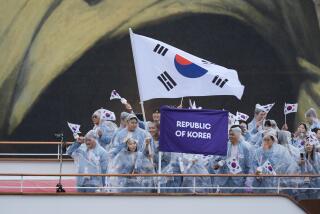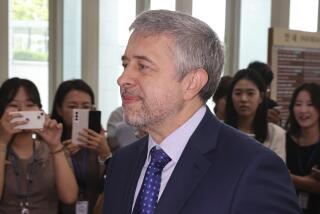Scoreless, but Not Pointless
SEOUL — The final score could not have been more politically correct.
A rare “friendly” soccer match designed to promote harmony between old enemies North and South Korea ended in a tie here Saturday night: 0-0.
It hardly made for spectacular sport. This was no World Cup, to be sure, even though the match was played in the same stadium where this year’s tournament kicked off in May. But Saturday’s game was so dull that much of the crowd of 60,000 dashed for the subway before it was over.
From the standpoint of diplomacy, however, everybody seemed immensely relieved. There had been fears that if something went wrong--if a victory was lopsided or a referee’s call hotly disputed--then the kind of ugly nationalist rivalries that intrude on soccer games under the best of circumstances could have disastrous diplomatic consequences.
“It is a nice game. It is about people coming together,” said Gus Hiddink, the Dutchman who coached the South Korean team during the World Cup.
“Just the fact that they are playing is a victory,” added Jean-Jacques Grauhar of the European Chamber of Commerce, one of the organizers of the event.
Politically, there were tremendous stakes riding on the match, the first between the North and South Korean teams in 12 years. It was also the first of a series of symbolic events scheduled in the next few weeks to promote reconciliation. The others include family reunions, a reconnecting of severed rail lines and North Korea’s participation in an Asian Games tournament in Pusan, South Korea. South Korean President Kim Dae Jung, the architect of the “sunshine” policy toward the North, desperately wants to see progress before his five-year term ends in February.
Fresh from having made it to the semifinals in the World Cup, South Korea was heavily favored to win Saturday. Although nobody would admit to pulling punches, the South Koreans didn’t send in most of the stars who had managed that earlier feat against all odds. In fact, only six of the 15 players Saturday had been in the World Cup matches at all.
Unlike during the World Cup, which brought millions of people into the streets of Seoul, the city decided against setting up large-screen televisions to broadcast Saturday’s game. That decision was apparently aimed at preventing anti-North Korea protests by right-wingers or pro-North Korea demonstrations from the left.
Outside the stadium, a handful of veterans marched with a banner denouncing North Korea, but they were surrounded by hundreds of riot police intent on keeping the situation firmly under control.
Since the North Korean flag is officially banned in South Korea, the organizers of the match discouraged South Korean fans from bringing their own flag into the stadium. The politically correct flag for the event featured a silhouette of the Korean peninsula on a pale blue field--the same flag used when the Korean teams marched together in the Sydney Olympics two years ago.
Instead of their customary red T-shirts, South Korean fans were encouraged to wear pale blue T-shirts emblazoned with such slogans as “We are one.”
In fact, the entire business of colors was fraught with diplomatic sensitivities. For this match, defying what might have been expected, the South Korean team was dressed in red, leaving the Communist North Koreans to wear white.
Not surprisingly, many fans were confused about what color they were supposed to wear or what players they were supposed to be cheering for. Many said they hoped for a draw.
“I have a blue jacket to symbolize my dream for reunification of the Koreas and red hair for my team,” said 17-year-old Chun Ji Young, a rabid fan of South Korea who wore a bright red wig and sported tiny soccer balls as earrings. “But tonight the politics of unification are more important than the game.”
Watching with decidedly mixed emotions was Kim Chul Young, 30, an actor who defected from North Korea last year. He said he was torn between cheering for the South Koreans and urging on the North Koreans, some of whom were from his hometown.
“Seeing the North Korean players arriving, I felt sorrow and sympathy. I felt like I could see exactly what was passing through their minds coming to South Korea: shock, envy and maybe a sense of inferiority. I feel sorry for them,” Kim said.
Before the 1950-53 Korean War wrenched the peninsula apart, soccer games between Pyongyang-and Seoul-based teams were an annual event. North Korea usually won and, at least through the 1960s, was considered the better team.
The consensus at the end of Saturday’s match was that the North Koreans were still surprisingly strong players, although they have less experience now in international tournaments because of their country’s diplomatic isolation.
“The North Korean defense was very good. They blocked all our paths,” South Korean player Lee Dong Gook told reporters after the match. “We have the best team in Asia right now--we went to the semifinals. But just think if we were unified, how good we would be.”
*
Chi Jung Nam in The Times’ Seoul bureau contributed to this report.






